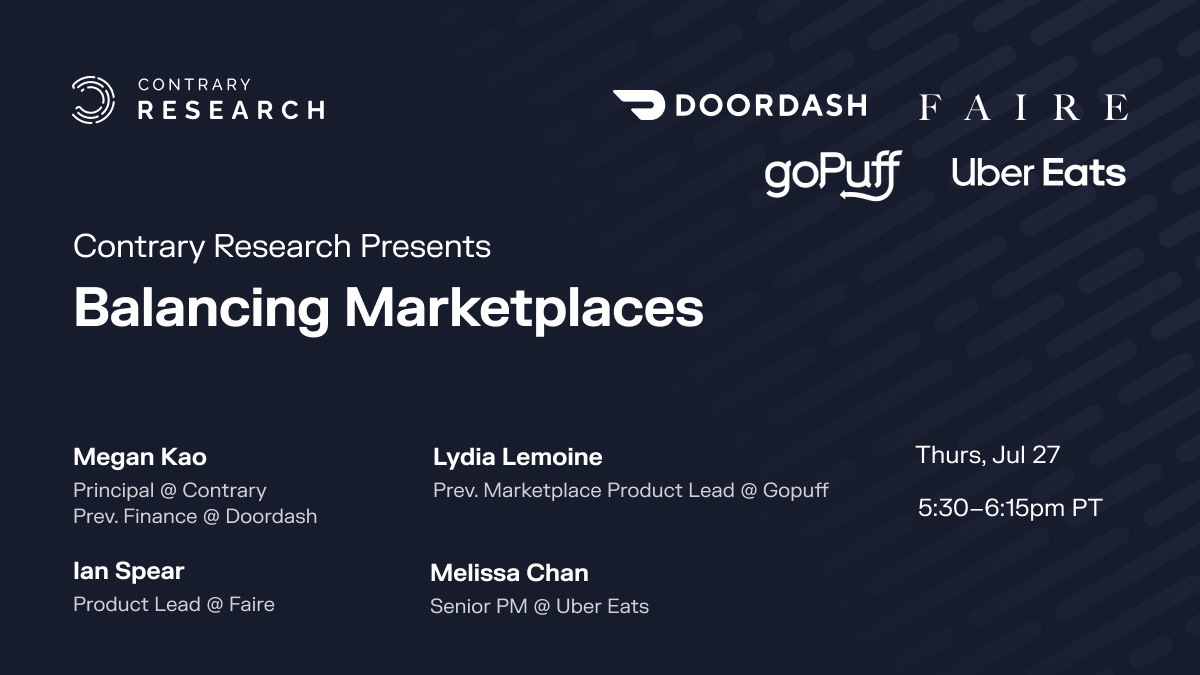Contrary Research Rundown #41
Unpacking increasing interest in secondary markets, and new memos on Linktree, Monzo and more
Research Rundown
In the last 18 months, rising interest rates caused a downturn in the private market for startup funding. Investor confidence decreased and many highly-valued private companies saw a rapid decline in valuation. Meanwhile, VC funds and other asset managers are increasingly interested in secondary markets, where they can buy stakes in private companies at discounted prices. Back in 2021 and early 2022, many fund managers couldn't get the ownership they desired or even participate in highly sought-after startups’ primary rounds due to high demand and valuations at the time. Today, however, fewer initial rounds and IPOs combined with more down rounds and industry-wide devaluations have made secondary prices more appealing.
At the same time, founders, employees, and investors are facing increasing pressure to sell their shares, pushing down secondary prices further. As of May 31, 2023, startup stocks sold at a median 61% discount versus their last funding round valuations. Nearly 90% of the companies whose shares traded in May 2023 had not raised capital in at least a year, and a third hadn’t raised new funding in two years or more. Caplight's secondary exchange saw an increase in bids for secondary shares, resulting in a decreased spread between buyers and sellers.
In this challenging environment, startups may occasionally face the difficult reality of down rounds or even secondary transactions at discounted prices. However, it is important to remember that the best companies will be able to weather the storm and emerge stronger than ever. These setbacks are temporary hurdles, providing opportunities for introspection and strategic realignment. By embracing the challenges head-on, startups can refine their business models, optimize their operations, and demonstrate resilience to investors and stakeholders. In doing so, they can attract renewed interest and support, ultimately positioning themselves for long-term success.
Linktree is a platform that allows creators to consolidate their online presence into a single link that they can share across different social media platforms. To learn more, read our full memo here.
Monzo is a challenger bank that aspires to change how banking is provided in the UK by addressing the poor service, low trust, and onerous fees frequently experienced with traditional banks. To learn more, read our full memo here.
Solv allows patients to book same-day doctors’ in-person and virtual appointments for urgent care visits. To learn more, read our full memo here.
Workrise is a workforce management and vertical labor marketplace that makes it easier for skilled laborers to find work and companies to find in-demand, trained workers. To learn more, read our full memo here.
Q&A with AWS Product VP Matt Wood on the generative AI boom, the escalating AI battle between the tech giants, curating the best AI models for AWS, and more
As the use of AI-generated ads in political campaigns increases globally, consultants and lawmakers push for setting up new guardrails.
How Apple is readying the Vision Pro to ship in 2024 and a look at its Mac plans, including upgrading its lineup to M3 and early work on a 30"-or larger iMac
Databricks agreed to acquire generative AI startup MosaicML in a ~$1.3B deal closing in Q2; MosaicML launched in 2021 and raised $64M.
DeepMind CEO Demis Hassabis shared details on Gemini, a ChatGPT rival they are building that combines the strengths of LLMs with AlphaGo-type systems.
Meta announced Quest+, a VR subscription that gives Quest 2, Quest 3, and Quest Pro users access to 2 games monthly for $7.99/month or $59.99/year.
Some doctors say their current best use for generative AI is to ease the heavy burden of documentation, which takes hours a day and contributes to burnout.
A look at Newark Public Schools' test of AI chatbot Khanmigo, one of the first in the US, and concerns over the tool doing too much of the students' thinking
John B. Goodenough, who shared the 2019 Nobel Prize in Chemistry for his role in developing the lithium-ion battery used in mobile devices and EVs, dies at 100
Snowflake partnered with Nvidia to let customers build generative AI models using their own data.
Thomson Reuters agreed to acquire YC-backed Casetext, which builds AI-powered workflows and tools for lawyers, for $650M in cash.
Sam Altman told developers in May that OpenAI plans to turn ChatGPT into a “supersmart personal assistant for work,” setting up a Microsoft rivalry.
Y Combinator received a record 24K applications for its latest cohort, accepting less than 1%, of which around 35% focus on AI and 50% use AI in their business.
OpenAI's ChatGPT iOS app added Bing for ChatGPT Plus subscribers, drawing on information that extends beyond original training data to answer questions.
We’re excited to announce that Contrary Research will be hosting Ian Spear of Faire, Melissa Chan of Uber Eats, and Lydia Lemoine (ex-Gopuff) for a product-led conversation around balancing marketplaces. Join us on Thursday, July 27th for an intimate conversation led by Contrary Principal Megan Kao as we dive into Balancing Marketplaces. Express interest in joining us here. Space is limited so sign up soon — we’ll be in touch about your registration in the coming weeks.












